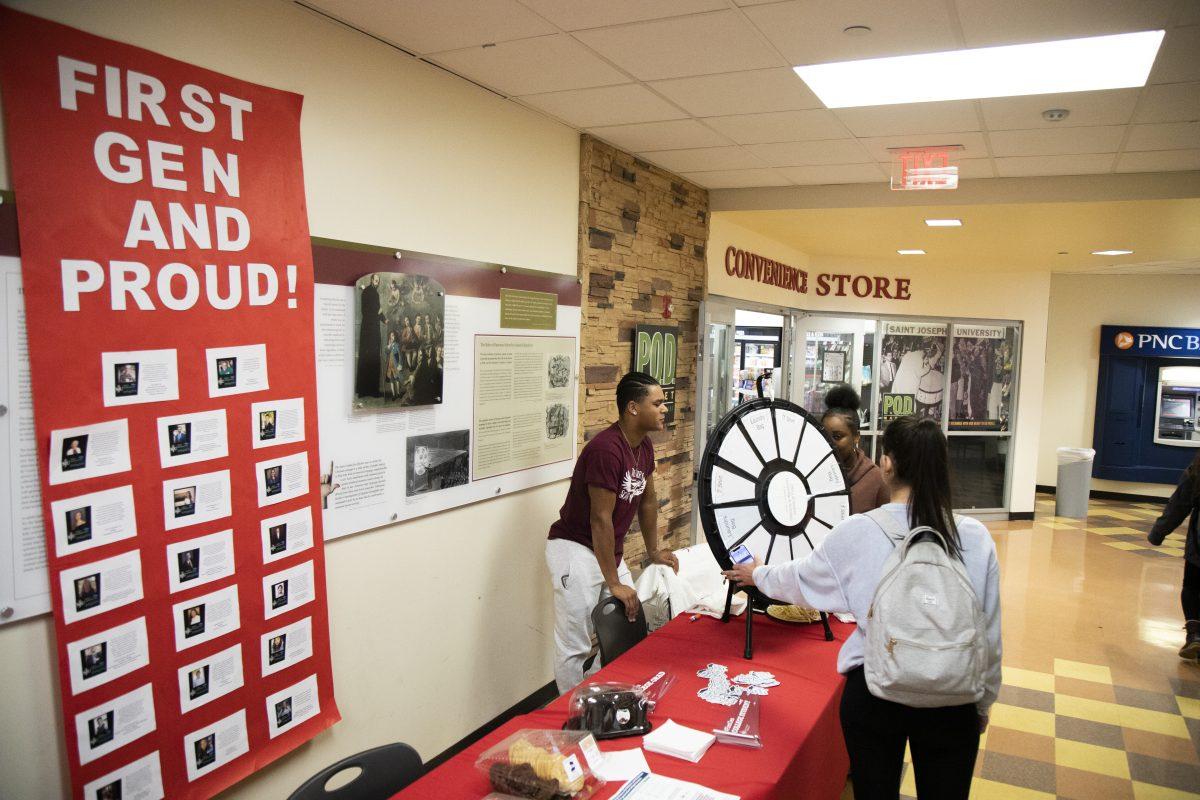Biology major Valentina Vavlas ’23 hopes to pursue a career in medicine some day, but first she has to navigate college as the first person in her family to do so.
“I have to do things differently than most people,” said Vavlas, who is from northeast Pennsylvania. “I don’t have people to go to to ask about things, so I kind of have to figure everything out on my own.”
Vavlas is one of nearly 700 undergraduate students at St. Joe’s who are the first in their family to attend college.
The university celebrated National First Generation College Student Day on Nov. 8 in order to let the first generation undergraduate students who attend St. Joe’s know that they are not alone.
“It’s so that first gen know they’re appreciated, and that they’re supported, but also so that people that are not first gen can recognize, ‘There’s someone who’s different than me here,’” said Maggie Oliver, student support program specialist in the Office of Haub School of Business Graduate Advising, and a first generation student herself.
Led by the Office of Inclusion and Diversity, the celebration took place from 10 a.m. to 2 p.m. in the Campion Student Center. Giveaway items included snacks, T-shirts and a wheel that first generation students could spin to receive items such as laundry bags and stickers. Attendees, including students, faculty and staff, could also pick up pennants to hang.
“This [pennant] is for faculty and staff who are first gen,” said Nancy Komada, Ph. D., director of student transitions in the Success Center. “You would hang this in your office and that would identify that you are somebody who can support students because you have been through it yourself.”
A focal point at the celebration was a large red poster with quotes from first generation students, faculty and staff. Natalie Walker Brown, director for Inclusion and Diversity Educational Achievement, said first-generation students, staff and faculty were asked to complete profiles to be displayed on the poster, on electronic screens around Campion, and on the Center for Inclusion and Diversity Twitter page.
“They were asked basically three things,” Walker Brown said. “What does it mean to be first gen? What are the advantages and challenges of being first gen? And what advice you would give?”
One student who submitted a profile was Daniella Campos ’23, an international relations major from Queens, New York.
“Being a first generation college student means being a cumulation of the hard work and obstacles I have endured in my life,” Campos said. “It is my chance to do better than my parents and make something out of myself, even if others don’t believe in me.”
According to Komada, many of the struggles first generation students face are because they don’t have adults at home to help guide them through the college experience.
“Students whose parents don’t have a degree, [we] help them through the jargon and the specialty kind of things that higher ed has,” Komada said. “For example, dropping and adding a class, withdrawing from a class—how would students know that if their parents can’t initially guide them?”
An additional struggle is that a lot of students also deal with intersectionality, meaning they have multiple identities that bring them challenges. Many first generation students are also, for example, commuters or come from low-income families.
“What I see with the [first generation] commuter students is that they still maintain their life at home,” Komada said. “So they’re still taking dad to the doctor’s appointment on Wednesday afternoon, and taking little brother to after school care, and negotiating that as well as a bio major.”
Despite added challenges, 42% of the university’s first generation students are on the Dean’s list, Komada said.
“These students develop resilience and grit that sometimes other students don’t have,” Komada said.
Vavlas, who attended the celebration, said she appreciated the message behind it.
“I think it recognizes kids like myself and others who are all trying to figure it out on their own,” Vavlas said.
Organizers said the event was also largely to remind first generation students that they have a support system within the university.
“A lot of what various offices on this campus are trying to do is to help fill in the gaps and help people have as good of an experience as possible, despite the number of challenges,” Oliver said.














































